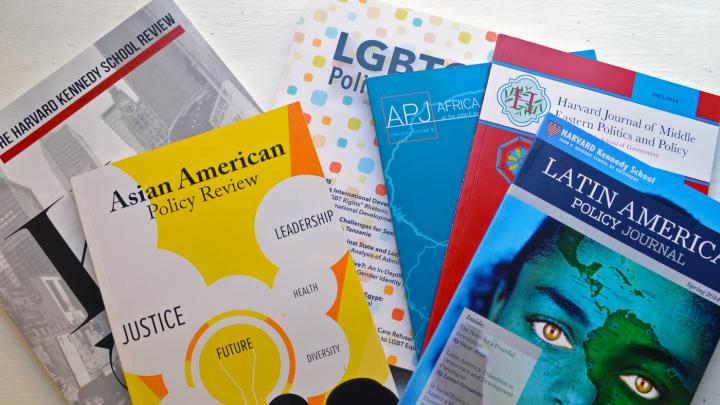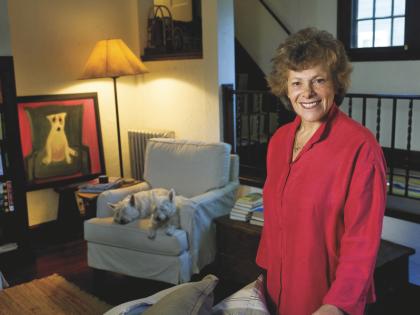The summer before Juana Hernandez, M.P.P. ’15, arrived at the Kennedy School (HKS), a copy of The Harvard Journal of Hispanic Policy (HJHP) arrived in the mail. It was the first time she’d seen the slim print journal, which editors sent as part of a campaign to welcome Latino-identifying students to campus. But the publication’s reputation had preceded it—Hernandez had heard about it from HKS alumni she’d met in college, mentioned it in her personal statement when applying, and even considered it a major factor in her decision to enroll. “Pretty much anyone I had known that was a Latino alum from Harvard had participated in the publication,” she reports. “To me, it signaled something really important and valuable as a prospective applicant.” For Hernandez, HJHP’s editor-in-chief this academic year, the journal serves as a place for students to engage with policy as it’s being made.
Founded in 1985, HJHP is the oldest of the Kennedy School’s student-run journals, and was soon followed by the Harvard Journal of African American Public Policy and the Asian American Policy Review. At the time, the three publications offered a new model for policy research, which, in contrast to the role that law reviews have long played in the legal academy, has never had a legacy of student-edited publications.
During the last 15 years, HKS has added to its roster a general policy review journal, as well as publications focused on issues affecting the LGBTQ community, Latin America, the Middle East, Africa, and Singapore. This year, the school put out nine journals, exceeding the combined number of journals at all other public-policy schools in America, according to lecturer in public policy Richard Parker.
A senior fellow at the Shorenstein Center on Media, Politics, and Policy and a founder of the magazine Mother Jones, Parker has served as the adviser for these student publications since the late 1990s. He has focused on expanding their scope and scale, aiding with the development of new publications and using his experience in commercial journalism to encourage editors to move beyond the traditional confines of academic writing. The journals, he says, should not necessarily compete to publish tenured and tenure-track academics. Rather, editors can use their content choices to help broaden the view of how policy is made and, in the process, connect with wider constituencies of politicians, journalists, and community leaders. Many of the journals’ websites and recent print issues have featured op-eds, interviews with policymakers—even photo essays and other visual art speaking to political themes. In Parker’s view, editors should feel free to decide: “I’m going to put poetry alongside that regression table.”
The journals’ efforts to break down the traditional boundaries of policy extend to their staff, who Parker hopes will be drawn from schools across Harvard and even the Boston area. These recruitment efforts attracted HJHP’s incoming editor-in-chief Jeffrey Reynoso, a doctoral student at the Harvard T.H. Chan School of Public Health. The interdisciplinary focus that arises from editors’ diverse interests, he argues, has allowed them to expand the conversations surrounding Hispanic policy. “It [creates] a platform—a Harvard platform—that shows [that] immigration is one issue that is important to this community, but so is renewable energy, and so is public health,” he says.
A similar ethos—that communities are diverse, as are the policy issues that affect them—has animated the LGBTQ Policy Journal, says editor-in-chief Crosby Burns, M.P.P. ’15. Although the journal was founded just five years ago, Burns notes that the policy landscape surrounding LGBTQ issues has changed dramatically. Burns and his staff helped formalize a mission statement for the publication this year, and he says they placed “pushing the envelope, encouraging debate, and thriving on controversy” at the center of it. He points to the pieces in this year’s edition, including work on community policing in an LGBTQ context and transgender sex workers in Shanghai. “They’re really pushing the thought leaders in the movement to think beyond some of the traditional issues, such as marriage equality and discrimination.”
Through these publications, staffers say, they are better able to connect their time as students with both their past experiences in the field and their future career aspirations. Parker’s own story—an Oxford-trained economist, journalist, and now Harvard faculty member—reflects the close ties between academia and practice in the world of policy. The journals, he says, can extend those bridges to the student population, so they see themselves as able to “take control of the narrative” while still in school.
These connections are made even more concrete because the journals build networks of students, alumni, and policymakers. HJHP, as the most established program, has the most robust of these ties to the world beyond Cambridge. Each year, graduate fellows at the Congressional Hispanic Caucus Institute submit their white papers for review, and the institute has in turn invited journal editors to their annual conference in Washington, D.C. The journal also has an active Executive Advisory Board of past editors and other prominent Latinos and Latinas in the business, government, academic, and nonprofit sectors. They contribute to the journal financially, and offer advice to students. After so many years at the center of the Latino community at HKS, it’s little surprise that the journal has developed ties to important parts of the policy world. California congressman Raul Ruiz, M.D.-M.P.P. ’01, M.P.H. ’07, for example, served as editor during his time at Harvard.
But the HKS journals, like all print publications, face new challenges as the landscape of policy writing and journalism changes. The Internet presents obstacles as well as opportunities. It can be difficult to sell the print publications, and maintaining interest in subscriptions requires keeping some of the best work offline. “I don’t know who’s reading this. We don’t sell that many journals,” Burns says about LGBTQ Policy Journal. “I’m dubious as to whether or not we’re having a huge impact.” Crucially, he adds, “It doesn’t mean we couldn’t in the future.” Even so, the Web presence that the journals have already been able to cultivate does give these Cambridge-based publications a chance for wider influence. When HJHP editors looked at the metrics on their Facebook page, they noted that the largest number of likes came from Los Angeles and D.C., not Cambridge or Boston. The newest HKS journal, which focuses on Singapore, has decided to publish online only, as a way to better engage a conversation happening halfway around the world. The Internet, Parker says, “represents a threshold break, in terms of the potential for these kinds of journals to reach audiences that I’m keen to have them take advantage of.”
The journal program began as a way for HKS students to develop their voices on campus. But the traction the publications have been able to gain beyond Cambridge speaks to the void they fill in the policy world, Parker contends. He gives the example of typing the words “African American policy” into Google, and finding the Harvard Journal of African American Public Policy among the top results. “There’s a dearth of coverage of these issues,” he says. “And these little student journals are fulfilling a real function in the world.”








